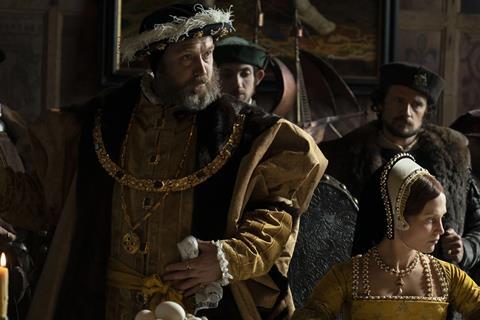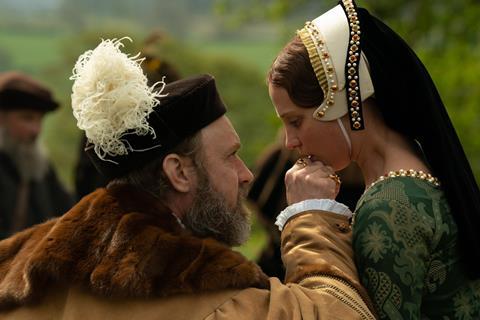Jude Law is busier than ever in front and of behind the camera as a producer through Riff Raff Films. The UK actor talks to Screen about his transformation into his Bafta-longlisted role as Henry VIII in Firebrand.

UK actor Jude Law has started early 2025 juggling the search for projects for his Riff Raff production outfit with promotional duties for his role as Henry VIII in Karim Ainouz’s Firebrand, for which he has been longlisted for best actor for the Bafta Film Awards, and the international rollout of Justin Kurzel’s The Order, produced by Riff Raff, in which he also stars.
Law also has an onscreen role in the upcoming Riff Raff series Black Rabbit for Netflix. However the idea going forward is to stay firmly behind the camera on Riff Raff projects.
“I knew I would have to do some of the heavy lifting initially to get things moving [on Riff Raff] but our aim is rather than projects being constructed around me as an actor, it’s about nurturing and developing projects and empowering filmmakers to do what they want to do,” Law explains.
For now, the focus is back on Firebrand, a film (not produced by Riff Raff) that first launched in competition at Cannes in 2023. Law stars alongside Alicia Vikander who portrays Henry VIII’s sixth wife Katherine Parr as she fends off the suspicions of her ailing husband and his courtiers to fight for her own survival.
The film marked Ainouz’s English-language debut. It is produced by Gabrielle Tana’s then-production company Magnolia Mae Films (Tana has now formed Brouhaha Entertainment), with Carolyn Marks Blackwood. Metfilm released the film in the UK in September where it grossed £410,000.
Law talks to Screen about what attracted him to the role, how he prepared to play the Tudor king and why a foul-scented perfume helped him step into character.
How was Firebrand pitched to you?
There was a script that I knew was going to need work, but the combination of Gaby Tana, the producer, and Karim - who I didn’t know but whose work I then went back and watched and admired - made it clear this was going to be very exciting and refreshing.
Karim had a unique approach, not just as a filmmaker but also to the subject because he was Brazilian and because he didn’t really know an awful lot about the history. He enjoyed the material as a sort of domestic drama, as opposed to a historical piece looking specifically at royalty.
I’d also be lying up if I didn’t say I just saw huge potential in playing Henry VIII. No one had really tackled this chapter of Henry’s life before. There was so much to get into, whether it was his ailing health, his physicality, the end of a tumultuous life.
What stood out to you in your research for the role?
I went down the rabbit hole and just tried to read everything. Initially, Karim wanted us to read literature on the period and on the king which were written by women which I thought was a wonderful direction. That led me to Antonia Fraser, who I knew through her late husband Harold Pinter, who wrote a wonderful book on Henry’s wives. She talked about him as a romantic. No one intends on having this many wives, he went into every marriage thinking it was the one. There’s this sort of collapsed romance. A sense of a man who wants to be loved, and was once incredibly lovable, and had slowly decayed into someone who was completely unlovable. That to me was a real key insight.
Also, I discovered he wore glasses. I thought that was a wonderful detail that had never really been highlighted before so there was one scene where I wore these little glasses while doing paperwork.

How long did you have to rehearse with Alicia and Karim?
Once we were all in the same country, we were able to spend quite a lot of time together, both in London and then on location [in Derbyshire in the UK] with the rest of the cast. Some days we just talked, some days we danced, and some days we really just got into how a scene might work.
The characters in Henry’s privy chamber were all played by actors I’d worked with before in plays and travelled with. Power is often better demonstrated by how people respond to you, not by how you act, so it was important to develop a sense of that through those around Henry. It was important that these actors knew me, and I could trust them quickly, that we already have a shorthand.
Karim was very open to that, so we called up a few guys I had worked with and they were all excited to evolve this dynamic with me.
Why did you choose not to wear prosthetics for the role?
I know they’re quite popular at the moment, but to me, personally, it feels like wearing a mask. What was exciting was that Jenny [Shircore, make-up and hair designer] and I tried to find Henry in me, and that felt very rewarding.
You wore a special perfume made of “pus, faecal matter and sweat” and walked around with a special gait. How did these physical transformations help your characterisation?
The more I read up on Henry, the more evident it became that physical pain was a big part of what he was experiencing and living at that point in his life, it was all-encompassing. The weight of the costumes and adding extra weight helped give a sense of physical weight. Then growing the beard to the right length and padding cheeks in a certain way – it was all accumulative in a way. There there becomes a moment where you look at it all in the mirror and think “Am I foolish? Is this foolish?” But each layer is key.

























No comments yet